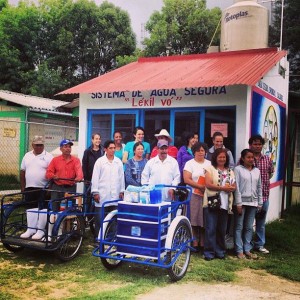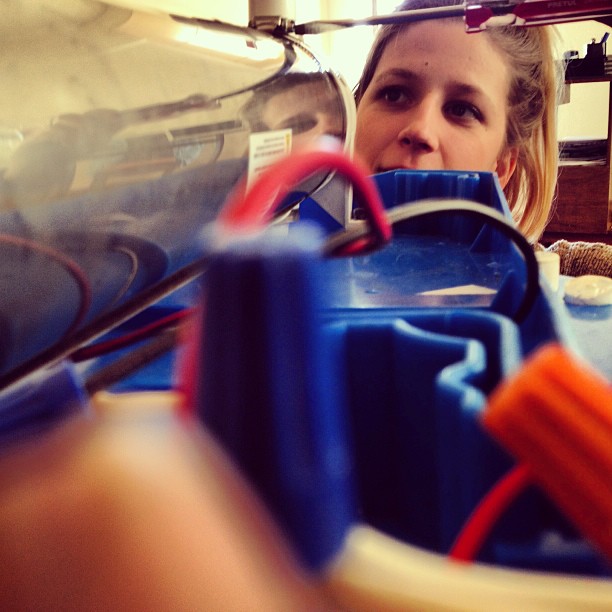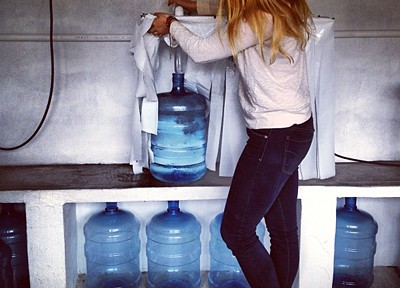Rebecca Peters is a 2013 Udall Scholar, 2013 Truman Scholar, and 2014 Marshall Scholar. After moving to the UK from California to study international development at the University of Manchester, Rebecca joined King’s Water to pursue a MSc Water: Science and Governance.

Rebecca sees access to water as essential to achieving basic human rights, environmental sustainability, and geopolitical stability. Over the past decade, her community work has taught Rebecca that achieving water access for all is not just a technical challenge for scientists and engineers, but a significant legal, political, and social problem. Through her participation in local stream restoration and as a member of the Environmental Commission of her local city council in America, Rebecca witnessed how collaborative water management can empower community participation in environmental decision making. Joining her community to address local water pollution issues resonated on a personal level and Rebecca planned to dedicate my career to restoring local waterways as an environmental scientist. However, her path radically shifted during the second year of university at California Polytechnic in 2010 as she came to understand neglected global dimensions of struggles regarding access to water. With an engineering class, Rebecca traveled to Guatemala to develop a safe water project with a rural community. While she saw the improved health outcomes that safe drinking water could deliver, she also realised her technical education would not be sufficient to address the social and political issues threatening water availability for poor people. Coming to understand that water is required to achieve livelihood advancement and environmental system health inspired Rebecca to transfer to the University of California, Berkeley to study Environmental Science (BSc) and Interdisciplinary Development Economics (BA). That was the first step on her path to systemically confronting global water challenges.
To continue grounding the theory behind the water policies Rebecca hopes to lead in the future, she has based her graduate study in currently unfolding issues of water access. While researching for her MSc in Poverty and Development at the University of Manchester, Rebecca spent two months in South Africa seeking to better understand unequal water access by interviewing emerging farmers and mapping irrigation systems. Her first master’s thesis captured these issues.
“Some are more equal than others”: the prioritization of development over equity values in South Africa’s water reform
Following the establishment of democracy in 1994, the South African government embarked on a series of legislative reforms to provide a foundation for equitable social and economic development. While redress of historical injustice in access to land provided a mobilizing force for the overturn of the apartheid government, inequality in access to water was even more pronounced (Woodhouse 2012). The 1998 National Water Act sought to address allocation disparities through the adoption of decentralization, participation, and economic pricing strategies for water governance and management. However, as this paper will argue, economic value as articulated through scarcity discourse emphasizing efficiency, productivity, and pricing for water has taken precedence over social equity values underpinning redistributive and human rights principles of water allocation reform. Drawing on this empirical research across the Inkomati Usuthu catchment in Mpumalanga province and covering the completion of the water use licensing process, new facts emerge suggesting that the economic aspects of water value by dominant users in the catchment, primarily commercial irrigated agriculture, have subverted the transformative potential of water reallocation following equity values.
 Following her time in Manchester, Rebecca decided to study with King’s Water in order to enhance her ability to speak with people across diverse water backgrounds (science, policy, academia) about unequal water access. Rebecca sees the MSc Water: Science & Governance course as an important mechanism training young leaders dedicated to combining an analytical knowledge of technical water issues with experience across environmental, political, and poverty arenas. The course embodies her belief that global imperatives to address water insecurity and poverty are not only moral ideals, but also rights rooted in social justice and the responsibilities of governments.
Following her time in Manchester, Rebecca decided to study with King’s Water in order to enhance her ability to speak with people across diverse water backgrounds (science, policy, academia) about unequal water access. Rebecca sees the MSc Water: Science & Governance course as an important mechanism training young leaders dedicated to combining an analytical knowledge of technical water issues with experience across environmental, political, and poverty arenas. The course embodies her belief that global imperatives to address water insecurity and poverty are not only moral ideals, but also rights rooted in social justice and the responsibilities of governments.
Mentored primarily by Tony Allan and Naho Mirumachi at King’s, Water Policy has been Rebecca’s favourite class of the MSc thus far. The varied lectures and presentation styles, expertise of faculty and speakers, and active contribution from my course mates makes coming to class always fun.
 Rebecca has recently been awarded a position with the REACH global research programme focused on water security for the poor hosted at Oxford University, where she will explore water use and regulation in Bangladesh through a DPhil.
Rebecca has recently been awarded a position with the REACH global research programme focused on water security for the poor hosted at Oxford University, where she will explore water use and regulation in Bangladesh through a DPhil.
In the future, Rebecca plans to work with intergovernmental organisations building links between academic and practitioner networks, creating water education programs, contributing to international policy advocacy, and committing to the prioritisation of marginalised peoples’ water issues. Her ultimate goal is to strengthen opportunities for international peace and justice through more equitable access to and decision making in water resources management and governance.
For Rebecca, water means:
Peace
Adventure
Community
Learn more about Rebecca and her water-related experiences via her LinkedIn profile. Keep up to date with her globetrotting and scholarly musings on Twitter (@rebeccampeters).
For more about study opportunities with King’s Water, check out our website. To keep up to date, follow us on Twitter!
